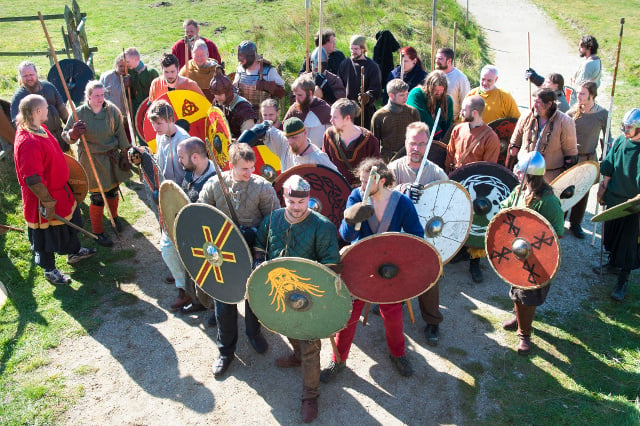Ah'm gan laikin in't beck.
That might not make much sense to anyone reading this, although technically it is in English. Perhaps if I put it in Swedish it might be better understood to some:
Jag går och leker i bäcken.
Or in plain old English: I'm going to play in the stream.
Like any good newcomer to Sweden, I began taking Swedish lessons. With English as my native tongue, I had the advantage that anyone with a shared Germanic route in their language has when learning Swedish – so many words seem familiar that it is a little easier to anchor them in your mind. For example, the classic lyric Jag trivs bäst i öppna landskap, can basically be understood in English – “I thrive best in the open landscape”.
What surprised me, however, was the amount of words that stirred up a lesser-used part of my dialect, something much more local and rooted in history. Raised in Cumbria, the picturesque rural region in the North West of England, next to the Scottish border, I have a less common set of colloquial words to draw upon that I didn't expect to be using once I left my home country, beyond amusing people with the still-used Cumbrian sheep-counting system.
One of the first words I learned in my Swedish lessons, gråta – to cry – sounded suspiciously familiar to greet, the Scottish term for cry, as in this phrase: greetin' like a wee bairn – crying like a little child. Which brings us to another common word: barn, meaning child in Swedish is equivalent to bairn in both Scottish and Cumbrian. Bra (good) is braw in Scottish.
A brief conversation with Tommy from the Cumbrian Dialect Society revealed many more, including some old Norse that is no longer present in Swedish, like hlaupa meaning 'to jump'. In Cumbria, we often lowp ovver yat, meaning one often 'jumps over the gate', a favourite and necessary pastime when cutting across the cow fields on country walks.
READ ALSO: Viking warrior found in Sweden was a woman

Matthew Gentry grew up in Cumbria in the UK. Photo: Matthew Gentry
So why then were so many words, even those that have been lost in Swedish, remained largely unchanged in my local slang?
Perhaps unsurprisingly, there is a very simple historical explanation. In the eighth century, the Nords began invading Britain. Fans of the HBO show Vikings will be familiar with Ragnar Lodbrok, the ferocious ruler who raided and pillaged much of Northern England. Well his sons, Ivar the Boneless and Halfdar Ragnarsson, took it a step further and set about conquering parts of the country.
By the year 886, they had established a second kingdom within England, covering the Northern and Eastern parts of the country as well as Southern Cumbria on the West coast. These regions came under what was known as Danelaw, a rule of law that lasted for almost a hundred years until Eric Bloodaxe was driven out of Northumberland.
The Vikings may have been driven out eventually, but it seems that, even though little physical evidence of them remains, a hundred years was more than enough to indelibly effect the language and landscape. As well as the impact on the local dialect, the Nordic invasion left its mark on place names all throughout my home county. These place names in Cumbria can be divided between those with an old Cumbric name, and those with a Nordic one. So many end with Dale, from the Nordic dhal for valley; we go walking through the fells (fjäll); many streets and towns across Northern England contain kirk in their name, from the Swedish kyrka, for church, or by, meaning homestead or town.
So, we can end up with the name Kirkby Lonsdale, meaning the 'Church town in the valley of the river Lon'. And it seems the Nords even still hold a claim over England's highest point: Scafell Pike bears the name derived from Sker (cliff) fjäll, and pic (peak) from the old Norse. It's also a name that returned home to the Nordics hundreds of years later in the 1970s with the Swedish/Irish folk group, Scafell Pike.
The Cumbrian dialect and place names reflect an element of the English language that is lost in time, more resilient to the ever-changing nature of every-day English, and so gives us a link back through history. Although the physical presence of the Vikings is long gone, except for a few buried trinkets, their impact on British culture remains.
The re-emergence of much of my local language in my Swedish lessons reminded me that despite the conflict and bloodshed hundreds of years ago, there is a shared history and culture present that goes right down to our roots. Perhaps that thought will warm me a little as I settle in for another Swedish winter.
Matthew Gentry is a life sciences technical writer based in Stockholm. He moved to Sweden in 2013. Follow him on Twitter here.




 Please whitelist us to continue reading.
Please whitelist us to continue reading.
Member comments